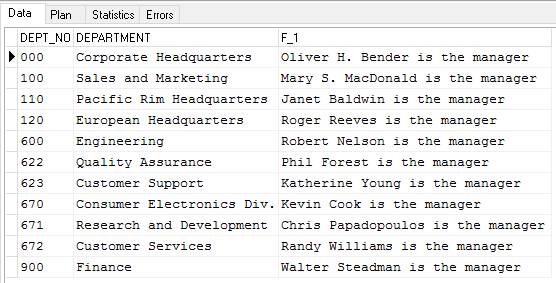InterBase Quick Start: Part IV - Formatting Data
Go Up to InterBase Quick Start: Part IV - Retrieving Data
There are three ways you can change the format of the data:
- Using
CASTto convert data types. - Using the string operator (
||) to concatenate strings. - Using
UPPERto convert characters to uppercase
Contents
Using CAST to Convert Data Types
You can only comapre similar data types in a search condition, but you can work around this limitation by using CAST. The syntax for the CAST clause is:
CAST ({<value> | NULL} AS data_type)
For example, the following WHERE clause uses CAST to translate a CHAR data type (interview_date) to a DATE data type. This conversion lets you compare interview_date to hire_date:
WHERE hire_date = cast(interview_date AS DATE)
You can use CAST to compare columns in the same table or across tables. CAST allows the conversions listed in the following table:
| From data type | To data type |
|---|---|
|
|
|
|
|
|
|
|
|
 Using the String Operator to Join Strings
Using the String Operator to Join Strings
The string operator, also known as a concatenation operator (|| ), joins two or more character strings into a single string. The source strings can be a result of a query or can be strings that you specify.
- Execute the following
SELECTstatement to concatenate the result of the query with the textis the manager. The query returns the names of managers for all departments that are not field offices.SELECT d.dept_no, d.department, e.last_name || ' is the manager' FROM department d, employee e WHERE d.mngr_no = e.emp_no AND d.department NOT containing 'Field' ORDER BY d.dept_no
The image below shows the expected result:
- You can concatenate as many strings as you like. The following query is a variation on the previous query: it adds the first name of a manager to the previous output:
SELECT d.dept_no, d.department, e.first_name || ' ' || e.last_name || ' is the manager' FROM department d, employee e WHERE d.mngr_no = e.emp_no AND d.department NOT containing 'Field' ORDER BY d.dept_no
In order to add a space between the first and last name, you have to insert a string that consists of a space. The image below shows the expected result:
Converting to Uppercase
The UPPER function converts characters to uppercase. For example, you can add a CHECK constraint that ensures all column values are in uppercase when defining a table column or domain. The following CREATE DOMAIN statement uses the UPPER function to ensure column entries are all uppercase:
CREATE domain projno AS CHAR(5) CHECK (value = upper (value));

